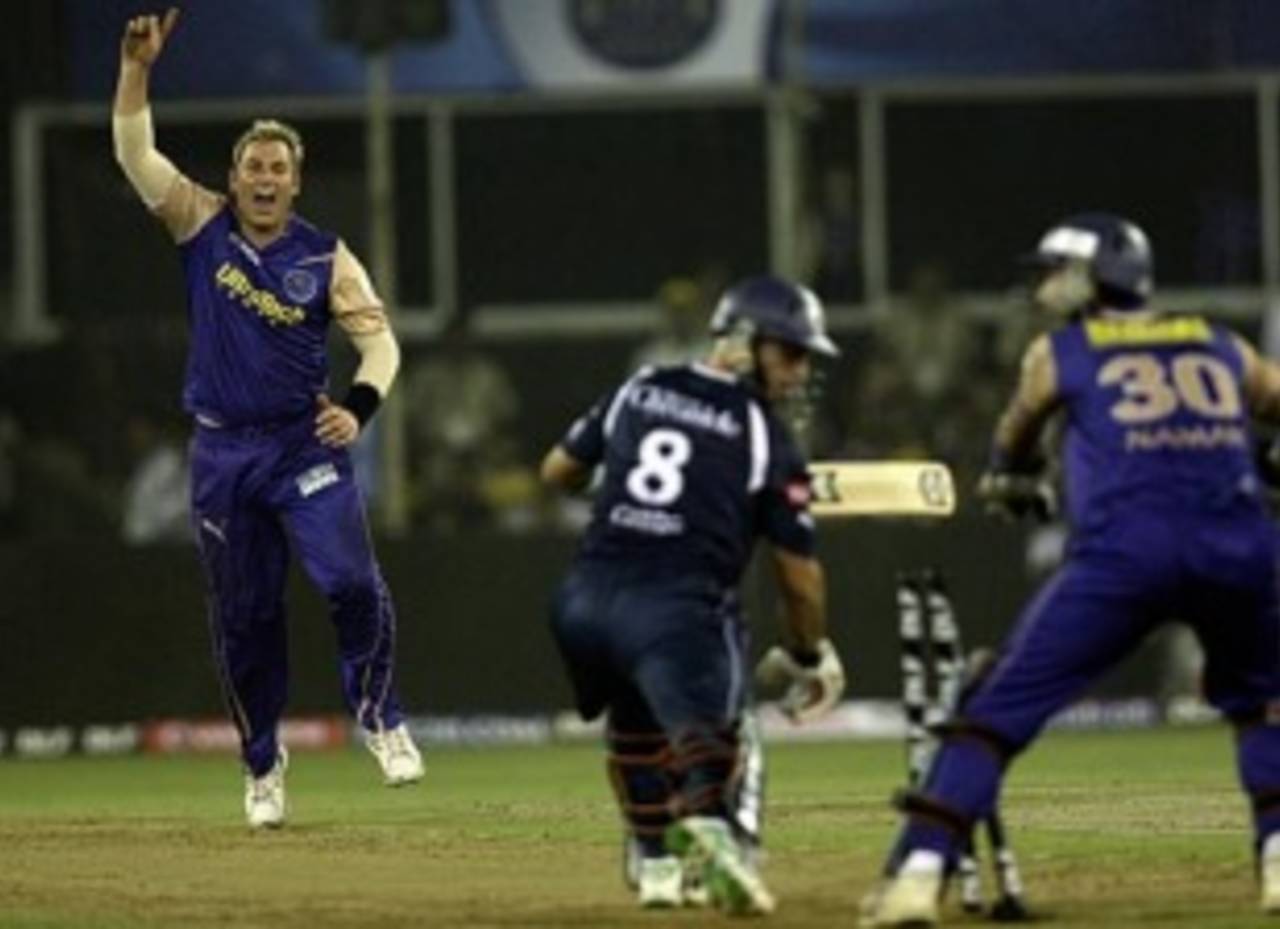On a warm night
in Nagpur, the IPL was seen in all its glory. Forget talk about obscene amounts of money, disregard for a moment the scantily clad cheerleaders, overlook the fawning celebrities and concentrate on the game: a tension-filled, competitive cricket match. Here was Shane Warne bowling at his wily best.
He spun the ball and a web around nervous, fidgety batsmen. This eventually led to a wicket, and amid the celebration Warne implored his team-mates to believe, to imagine that a glorious, much-needed victory was at hand.
When he wasn't dispensing devious deliveries, Warne was wracking his brain and waving his arms. He moved fieldsmen from outposts into threatening positions; he ignored the physical danger to his team-mates in order to further intimidate nervous opponents. He employed fielding positions that sent a message to both sides that we, the Royals, can win this game.
It was vintage Warne on all counts. His bowling was threatening and his captaincy was imaginative with a touch of genius. If a genius does oscillate between brilliance and madness, Warne was one minute Picasso, the next van Gogh. But mostly he was a leader who had the support of his players and the attention of his opponents. In the end his aggressive plotting prevailed, while the brave and resourceful Rohit Sharma's efforts fell just short. The Rajasthan Royals beat the Deccan Chargers by a whisker. But the result was only a minor detail, if not for the protagonists then at least for the game.
Here for all to see, the baying crowd at the stadium and the vast television audience, was Twenty20 cricket in its best light. A cricket contest of infinite skill and strategy, not one relegated by the flashy dancers and flouncing celebrities to sideshow status. This is a crucial point. For all the hype about being a billion-dollar industry, attracting Bollywood stars and rampant egos, the IPL does a lot of good for cricket - for both the game and the individuals who play it.
At a time when some international captains are content to allow opposing batsmen to score easy runs without putting their wicket at risk, thereby allowing the middle overs of ODIs to become more pedestrian than a jaywalker, Warne offered a viable alternative to these timid tactics.
And here was Rohit, a young Indian batsman of abundant skill, displaying the complementary nerve that is required to succeed at the highest level. The question is not whether Rohit has the skill to make it as a batsman in all forms of the game but whether the selectors will ignore his talents for so long that his best years will be past when he's finally chosen.
Having survived and prospered against Warne's devastating spell and taunting tactics will do wonders for Rohit's confidence. Hopefully it will also convince the selectors that he is a batsman for all seasons, not just the silly one.
For all the hype about being a billion-dollar industry, attracting Bollywood stars and rampant egos, the IPL does a lot of good for cricket - for both the game and the individuals who play it
This was a classic example of how the IPL's multicultural format, which puts Indian and international cricketers in the same arena, can benefit the game worldwide. In this case it was a former Australian player helping, albeit inadvertently, the cause of a talented young Indian cricketer.
In another example of the IPL's benefits, the young Australian tearaway David Warner seems to be benefitting from a close association with the Indian maestro of mayhem, Virender Sehwag. To witness close up and have the opportunity to talk to Sehwag about his modus operandi is an extraordinary piece of good fortune for Warner.
Like Rohit, Warner is in danger of being typecast. In his case as a hitter rather than what he really is: a batsman with explosive power. If Warner learns anything from Sehwag that helps him convince the first-class selectors back home that he should be playing all forms of the game as an ultra-aggressive opener, it will benefit him and Australian cricket.
Warner has already scored an IPL century under the watchful eye of Sehwag, and hopefully this won't go unnoticed in Australia. What also shouldn't be overlooked is that despite its occasional crass excesses, the IPL does offer much that benefits the game of cricket.
Former Australia captain Ian Chappell is now a cricket commentator and columnist
